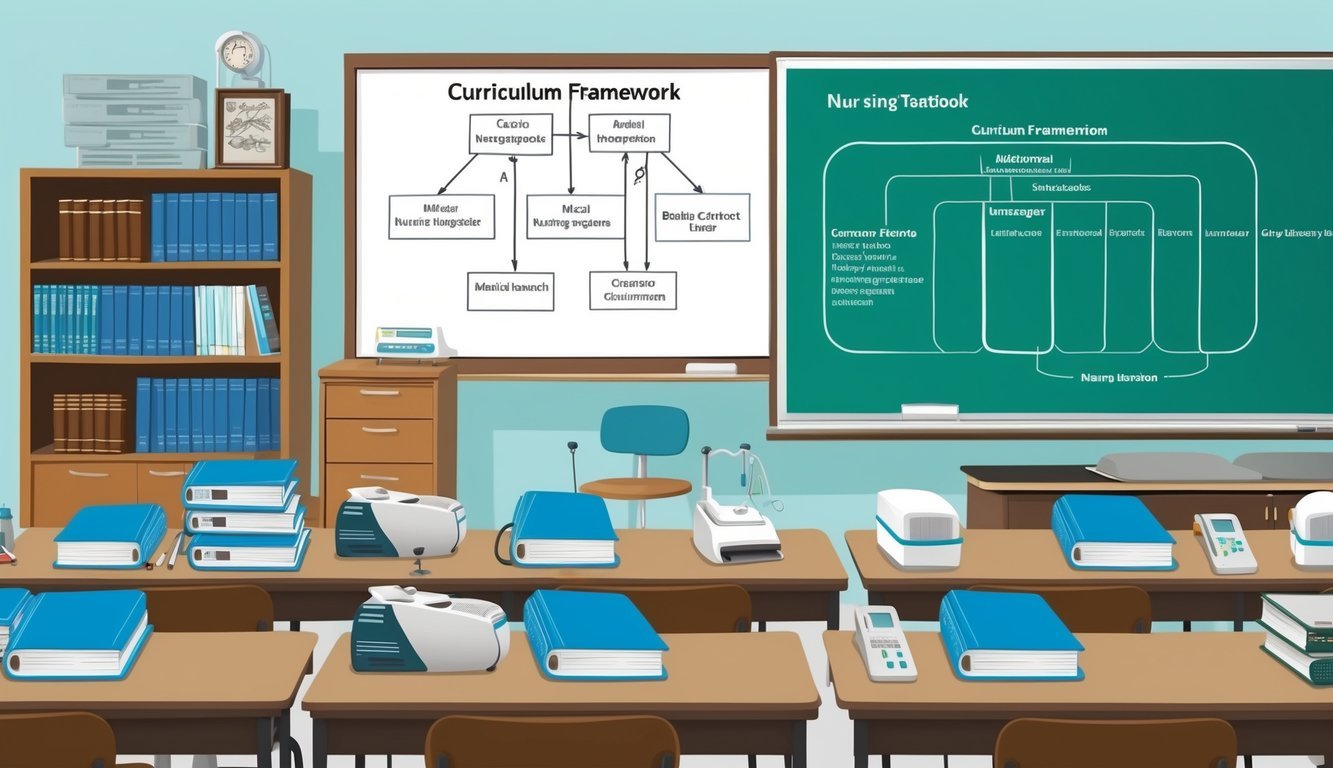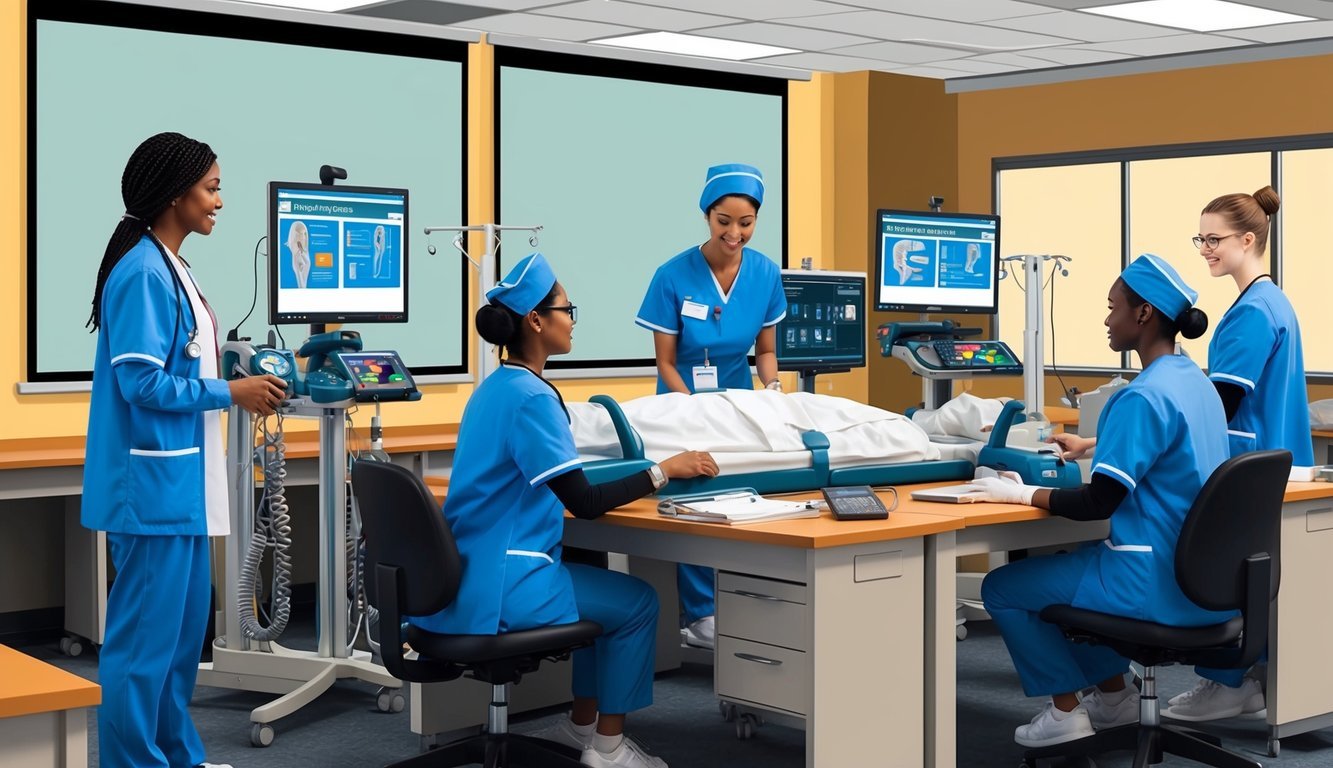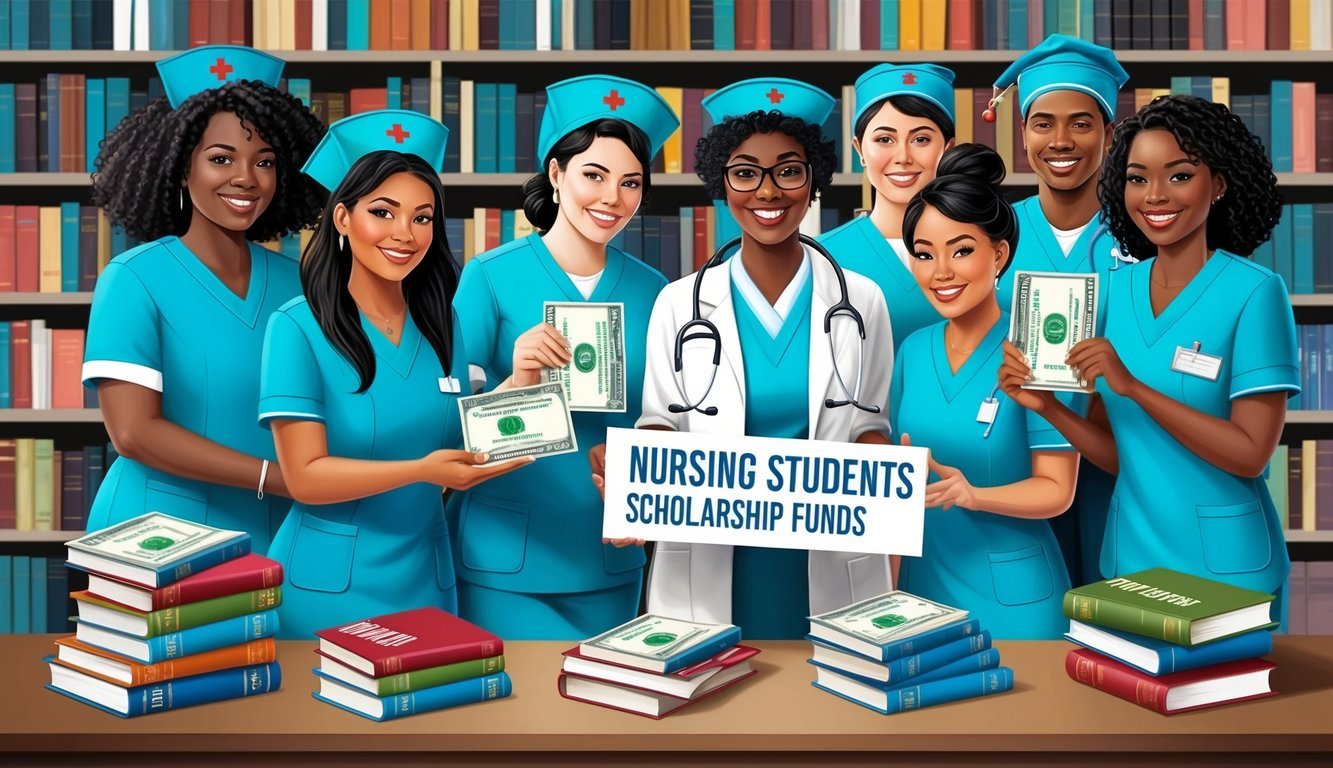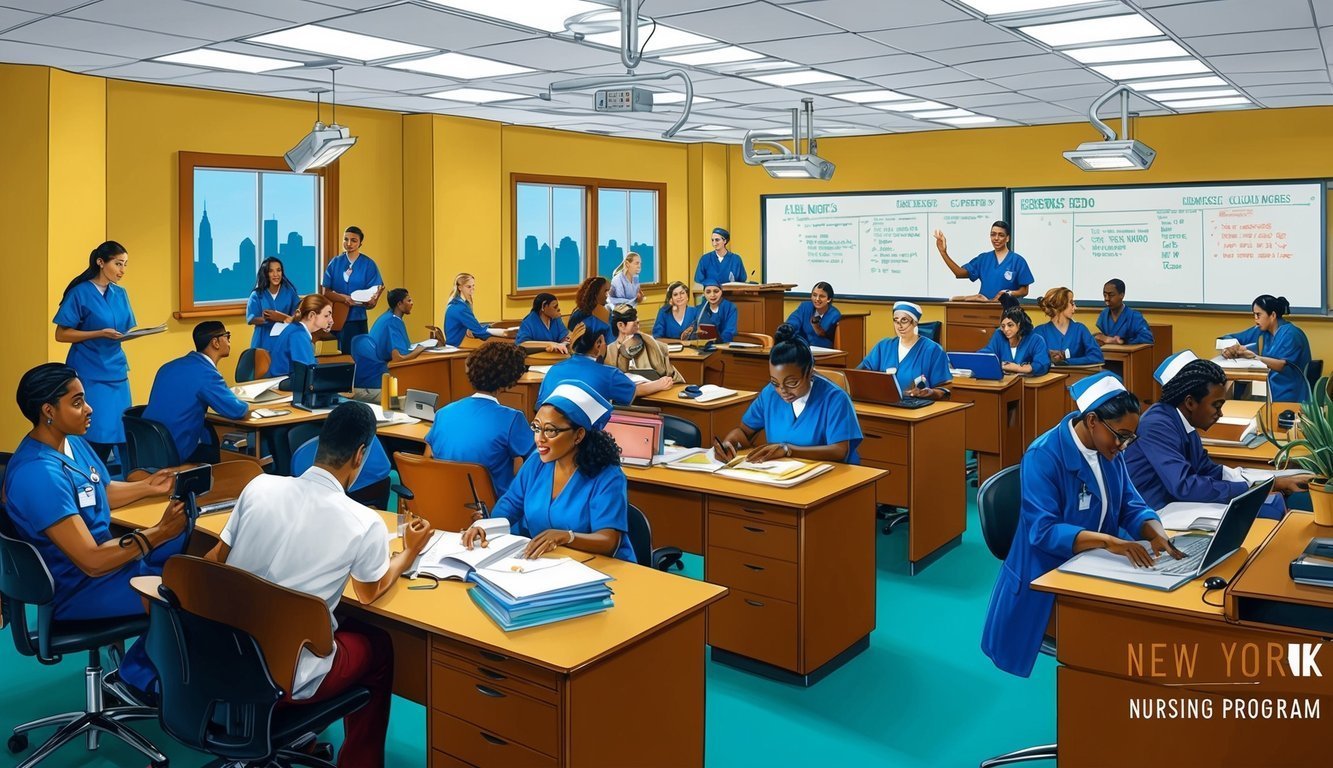Pursuing a nursing program in New York can open the door to a rewarding career in the healthcare field.
Numerous accredited nursing programs are available, including RN, BSN, and advanced certifications.
You have the opportunity to select a path that suits your career goals.
These programs are designed to provide you with essential skills and knowledge, preparing you to meet the demands of the fast-paced healthcare environment.
New York is home to some of the best nursing schools in the country, offering a variety of options ranging from traditional on-campus programs to flexible online courses.
Institutions such as the State University of New York (SUNY) and NYU Rory Meyers College of Nursing provide diverse pathways for aspiring nurses.
Factors to consider when choosing a program include tuition costs, accreditation status, and NCLEX pass rates, all of which play a crucial role in your success.
As you begin your exploration of nursing programs, consider your long-term goals and the type of nursing career you wish to pursue.
Researching the 20 Best Nursing Schools in New York can help you identify the right fit for your education and future aspirations.
Overview of Nursing Programs in New York

New York offers a diverse range of nursing programs designed to meet the varying needs of aspiring nursing professionals.
Whether you are interested in an associate, bachelor’s, or advanced practice degree, these programs are crucial for your career in healthcare.
Types of Nursing Degrees Offered
In New York, you can pursue several types of nursing degrees, each with different career opportunities:
| Degree Type | Description |
|---|---|
| Associate Degree in Nursing (ADN) | Typically a 2-year program that prepares you for entry-level nursing positions. |
| Bachelor of Science in Nursing (BSN) | A 4-year degree that provides comprehensive nursing education and is often preferred by employers. |
| Master of Science in Nursing (MSN) | Advanced education for specialization in areas like nurse practitioner or nurse educator. |
Programs are available at various institutions, including community colleges and universities.
Completing a nursing degree prepares you for the NCLEX-RN exam and is essential for obtaining your RN license.
Accreditation and Licensing
Accreditation is critical when selecting a nursing program.
In New York, nursing programs should be accredited by bodies like the Accreditation Commission for Education in Nursing (ACEN) or the Commission on Collegiate Nursing Education (CCNE).
Accredited programs ensure quality education and facilitate eligibility for the NCLEX-RN exam.
Upon passing this exam, you will obtain your RN license, which is required to practice nursing in New York.
Ensuring your program holds proper accreditation can greatly enhance your job prospects and ensure you are well-prepared for your career in nursing.
Admission Criteria and Process

Understanding the admission criteria and process is essential for aspiring nursing students.
The requirements often include specific prerequisite courses, standards for high school graduates and transfer students, and background checks.
Prerequisite Courses and Transfer Credits
Before applying, you need to complete certain prerequisite courses.
These typically include subjects like Anatomy, Physiology, Microbiology, and Chemistry.
Having a solid foundation in these areas is crucial for success in nursing programs.
Many nursing schools also allow students to transfer credits from other accredited institutions.
To maximize your previous college experience, you should check with the specific program about their policies on transfer credits and advanced placement.
Here’s a table summarizing common prerequisite courses:
| Course | Required Credits |
|---|---|
| Anatomy and Physiology | 8-10 credits |
| Microbiology | 4 credits |
| General Chemistry | 4 credits |
Additionally, be aware that most programs will require a criminal background check as part of the admission process.
Admission Requirements for High School Graduates and Transfer Students
High school graduates must demonstrate proficiency in basic skills, usually through standardized tests or high school GPA requirements.
Most programs require a minimum GPA, often around 2.5 or higher on a 4.0 scale.
For transfer students, meeting similar criteria is essential.
You must provide transcripts and possibly a letter of good standing from your previous institution.
Many nursing programs may also evaluate extracurricular activities, such as volunteer experiences in healthcare settings.
This can enhance your application.
Curriculum and Educational Framework

In nursing programs in New York, the curriculum and educational framework are designed to blend theoretical knowledge with practical application.
This approach not only prepares you for clinical settings but also enhances your critical thinking skills required for effective patient care.
Integrating Theory and Clinical Practice
The nursing curriculum includes a significant emphasis on both theoretical coursework and clinical experience.
You will engage in courses that cover essential topics such as pediatric nursing, medical-surgical nursing, and community health nursing.
This integration is supported through a structured program that incorporates hands-on clinical practice in various healthcare settings.
You will apply learned concepts to real-world scenarios, thereby enhancing your critical thinking and decision-making skills.
Important Components:
- Clinical Rotations: These provide exposure to different specialties such as pediatrics and geriatrics.
- Simulation Labs: These labs create realistic patient care scenarios to practice your skills.
For further resources on curriculum guidelines, visit AACN’s Teaching Resources.
Incorporating Liberal Arts and Sciences
Your nursing education also integrates liberal arts and sciences, which enriches your understanding of diverse patient backgrounds.
Courses in social sciences, including psychology and sociology, equip you to communicate effectively with patients from varying contexts.
Furthermore, subjects like English composition enhance your written communication skills, crucial for documenting patient care and collaborating with the healthcare team.
Key Liberal Arts Courses:
- Sociology: Understanding societal influences on health.
- Psychology: Grasping mental health aspects that affect patient care.
By embracing a well-rounded educational framework, you are prepared to navigate the complexities of modern healthcare successfully.
Leading Nursing Institutions and Programs
New York is home to several prestigious nursing programs that provide rigorous training and extensive resources for aspiring nurses.
The following institutions are among the top choices for nursing education in the state, offering a variety of programs tailored to meet diverse career paths.
NYU Rory Meyers College of Nursing
NYU Rory Meyers College of Nursing is renowned for its innovative approach to nursing education.
The college offers a variety of degree options, including Bachelor of Science (BS), Master of Science (MS), and Doctor of Nursing Practice (DNP) programs.
- Key Features:
- Simulation Learning: State-of-the-art simulation labs help you gain hands-on experience.
- Research Opportunities: The college emphasizes research, encouraging students to participate in projects that enhance nursing practices.
The diverse student body also fosters a rich exchange of ideas and perspectives, preparing you for a global healthcare environment.
For more information, visit NYU Meyers.
Columbia University School of Nursing
Columbia University’s School of Nursing is a leader in nursing education and research.
The school offers various programs, including accelerated BSN, MS, and PhD options.
- Key Features:
- Interdisciplinary Training: Opportunities to collaborate with other health disciplines enhance the learning experience.
- Global Health Initiatives: The program includes a focus on global health, allowing you to work on significant health issues around the world.
Their experienced faculty are dedicated to providing personalized mentorship, which is crucial for your academic and professional development.
For more details, visit Columbia Nursing.
Hunter-Bellevue School of Nursing
Hunter-Bellevue School of Nursing offers a strong nursing education recognized for its community engagement and commitment to social justice.
It provides a range of programs, including pre-licensure BSN, MS, and advanced practice nursing degrees.
- Key Features:
- Community-Based Learning: Clinical placements in diverse settings allow you to apply skills in real-world scenarios.
- Supportive Environment: The school fosters a collaborative atmosphere, enhancing peer learning and networking opportunities.
The faculty is dedicated to preparing you for the challenges of modern nursing practice, ensuring a robust educational experience.
For more information, check out Hunter-Bellevue.
Research and Simulation in Nursing Education

In nursing education, the integration of simulation and research plays a critical role in preparing future healthcare professionals.
This approach not only enhances practical skills but also fosters innovative practices through interprofessional collaboration and advanced technology.
Below are key aspects of how simulation and research intersect in nursing programs.
Utilization of Simulation Centers
Simulation centers are essential for nursing programs, providing hands-on experience in a controlled environment.
The Helene Fuld Health Trust Simulation Center is a prime example, offering state-of-the-art technology for realistic patient scenarios.
Students engage in various simulations, which allow them to practice clinical skills, decision-making, and teamwork without risking patient safety.
Key Features of Simulation Centers:
- High-fidelity mannequins that mimic real patient conditions.
- Scenario-based learning that promotes critical thinking.
- Feedback mechanisms to evaluate performance & improve competencies.
These centers are invaluable for bridging the gap between theoretical knowledge and real-world application.
Engagement in Cutting-Edge Research
Nursing education is increasingly informed by cutting-edge research, particularly in the realm of simulation technology.
Studies conducted by scientists in the field assess the efficacy of different simulation techniques, shaping curriculum improvements and teaching methodologies.
Innovative research explores how simulations can mimic acute care settings, enhancing students’ ability to handle real-life situations.
Research Focus Areas:
- Effectiveness of simulation versus traditional clinical experiences.
- Best practices for integrating technology into nursing education.
- Long-term impacts of simulation training on nursing competencies.
By engaging in this research, programs can continuously evolve to meet the needs of modern healthcare systems.
Fostering Interprofessional Collaboration
Collaboration among healthcare disciplines enhances the learning environment for nursing students.
Simulation centers often bring together nursing, medical, and allied health students to work on interdisciplinary teams.
Engaging in interprofessional collaboration prepares you for real-world healthcare settings where teamwork is essential.
Advantages of Collaboration:
- Development of communication skills across disciplines.
- Exposure to diverse perspectives and expertise.
- Strengthening of team-based care approaches.
This collaborative approach not only enhances your educational experience but also fosters a culture of shared learning that is vital in healthcare.
Funding and Scholarship Opportunities

When pursuing nursing programs in New York, various funding and scholarship options are available to support your educational journey.
These opportunities help alleviate financial burdens and encourage a diverse student body.
Scholarships
-
Nurses For Our Future Scholarship
This scholarship covers tuition for 1,000 new or current healthcare workers aiming for an Associate’s Degree in Nursing (ADN) or Bachelor’s of Science in Nursing (BSN). You can learn more about it here. -
Healthcare Workers for Our Future Scholarship
This scholarship is designed for approximately 500 individuals. It provides financial support for tuition, room and board at approved colleges. For more details, visit the program page here.
Additional Funding Sources
-
Federal Student Aid
The Federal Student Aid program offers funding options for eligible students pursuing education beyond high school. You can explore opportunities on the FSA website. -
Loan Forgiveness Programs
Consider opportunities through loan forgiveness programs available for nursing professionals. These programs are aimed at those working in underserved areas. More information can be found through local education offices.

